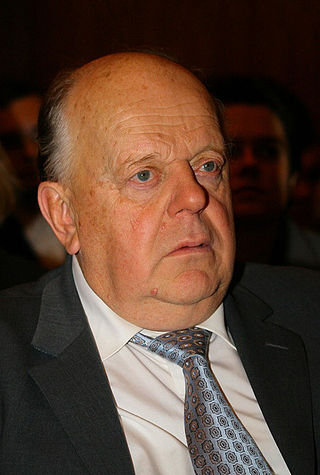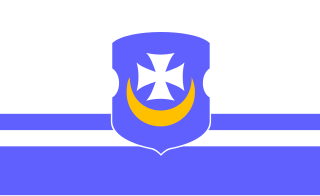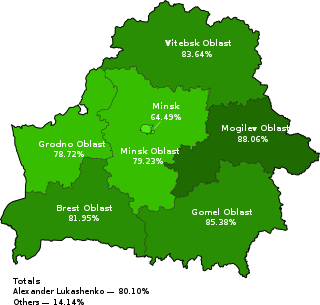
Alexander Grigoryevich Lukashenko is a Belarusian politician who has been the president of Belarus since the office's establishment in 1994, currently the longest in Europe.

Stanislav Stanislavovich Shushkevich was a Belarusian politician and scientist. From 25 August 1991 to 26 January 1994, he was the first head of state of independent Belarus after it seceded from the Soviet Union, serving as Chairman of the Supreme Soviet. He supported social democratic reforms and played a key role in the creation of the Commonwealth of Independent States.

Alaksandar Uładzimieravič Milinkievič is a Belarusian politician. He was nominated by the leading opposition parties in Belarus to run against incumbent Alexander Lukashenko in the 2006 presidential election.

Treaty on Free Trade Area is an international treaty on a free trade regime in goods signed by 8 post-Soviet states on 18 October 2011, at a meeting of the Commonwealth of Independent States (CIS) Council of Heads of Government in St. Petersburg and entered into force on 20 September 2012. It creates Commonwealth of Independent States Free Trade Area (CISFTA) among Russia, Ukraine, Belarus, Moldova, Armenia, Kyrgyzstan, Kazakhstan and Tajikistan. This Treaty and other agreements within the Commonwealth of Independent States do not regulate relations with third countries, the terms of the CIS FTA allow member states to enter into the FTA agreements with other countries, as well as to join/create custom unions.

Belarus has an embassy in Ashgabat. Turkmenistan has an embassy in Minsk. Both countries are full members of the UN, and the OSCE. Belarus is a full member and Turkmenistan is associated with the CIS. Currently, the ambassador of Turkmenistan to Belarus is Murad Yazberdyev. The Belarusian Ambassador to Turkmenistan is Oleg Tabanyuhov.

The 2011 Minsk Metro bombing took place on 11 April 2011 when 15 people were killed and 204 were injured when a bomb exploded within the Minsk Metro, Belarus. The explosion happened at the central Kastryčnickaja station at 17:55 local time.

Orsha District or Orša District is a district (raion) of Vitebsk Region in Belarus. The administrative center of the district is Orsha.

October Square is a square in the center of Minsk, Belarus, which is located between Independence Avenue, Engels streets and International Street. To its east side there are areas limited to buildings of the Palace of Culture of Trade Unions, the Museum of the Great Patriotic War and the Minsk Palace of Republic. Around the Square is the Central House of Officers, the residence of the President of Belarus, and the Janka Kupała National Academic Theater. On the square there are the main metro stations in Minsk: Kastryčnickaja and Kupawaŭskaja.

Valery Vilyamovich Tsepkalo or Valery Vilyamavich Tsapkala is a Belarusian politician and entrepreneur. After graduating from the Moscow State Institute of International Relations with a doctoral degree in international law and serving in the embassy of the Soviet Union in Finland, Tsepkalo joined the staff of the Belarusian Ministry of Foreign Affairs. He later became an advisor on foreign political and economic relations to the Chairman of the Belarusian Parliament, Stanislav Shushkevich, and then a senior advisor to the Secretary General of the Commonwealth of Independent States.

Nikolai Aleksandrovich Lukashenko is the third son of Alexander Lukashenko, the president of Belarus.

The Day of the Police of Belarus is a professional holiday of the Belarusian police (Militsiya). On 4 March 1917, Bolshevik politician and icon Mikhail Frunze was appointed the chief of the militia of the city of Minsk. This date is considered to be the birthday of the Belarusian police. The holiday was officially approved by decree of the President of Belarus Alexander Lukashenko on 26 March 1998.

Presidential elections were held in Belarus on Sunday, 9 August 2020. Early voting began on 4 August and ran until 8 August.
The COVID-19 pandemic in Belarus was a part of the worldwide pandemic of coronavirus disease 2019 caused by severe acute respiratory syndrome coronavirus 2. The virus was confirmed to have spread to Belarus, when the first case of COVID-19 in the country was registered in Minsk on 28 February 2020. As of 29 January 2023, a total of 19,047,714 vaccine doses have been administered.

The 2020–2021 Belarusian protests were a series of mass political demonstrations and protests against the Belarusian government and President Alexander Lukashenko. The largest anti-government protests in the history of Belarus, the demonstrations began in the lead-up to and during the 2020 presidential election, in which Lukashenko sought his sixth term in office. In response to the demonstrations, a number of relatively small pro-government rallies were held.

Maria Kalesnikava is a Belarusian professional flautist and political activist. In 2020, she headed Viktar Babaryka's electoral campaign during presidential elections of 2020 in Belarus. Kalesnikava represented the united campaign of Sviatlana Tsikhanouskaya, then she became a member of the presidium of the Coordination Council formed during the 2020 Belarusian protests in opposition to the regime of Alexander Lukashenko. She is also a founder of the 'Razam' political party.
The 1991 Belarusian strikes, also referred to in Belarus as the April Strikes, were a series of nationwide strikes and rallies in the Byelorussian Soviet Socialist Republic. Originally in opposition to price increases and a tax on goods from republics sold in another republic, the protests later turned into a broadly anti-Soviet movement, calling for the resignation of Soviet leadership, a reduction of the economic role of the Soviet government, and fresh elections to the Supreme Soviet of the Byelorussian Soviet Socialist Republic.

A constitutional referendum was held in Belarus on 27 February 2022. The referendum was ordered by President Alexander Lukashenko in January 2022. According to political analysts, changes to the Belarusian constitution were intended to solidify the power of Lukashenko's regime after the mass protests in 2020 and 2021, which challenged his rule and was brutally suppressed by police. More than 35,000 people were arrested, 1,070 of whom are acknowledged political prisoners. The changes to the Constitution allow Lukashenko to remain in office until 2035 and empower the All-Belarusian People's Assembly, an extra-parliamentary body dominated by government supporters. The changes also renounced Belarus's nuclear-free zone status, allowing Belarus to host nuclear weapons for the first time since the fall of the Soviet Union; the lead-up to the referendum occurred as Russia amassed its troops in both Russia and Belarus in the prelude to the Russian invasion of Ukraine, and the election itself was held several days after Russia began its military offensive into Ukraine.

Roman Dmitriyevich Protasevich or Raman Dzmitryevich Pratasevich is a Belarusian blogger and political activist. He was the editor-in-chief of the Telegram channel Nexta and chief editor of the Telegram channel "Belarus of the Brain".
The Union of Soviet Socialist Republics, commonly known as the Soviet Union was a transcontinental country that spanned much of Eurasia from 1922 to 1991. It was a founding member of the United Nations as well as one of the five permanent members of the United Nations Security Council. Following the dissolution of the Soviet Union in 1991, its UN seat was transferred to the Russian Federation, the continuator state of the USSR.
















